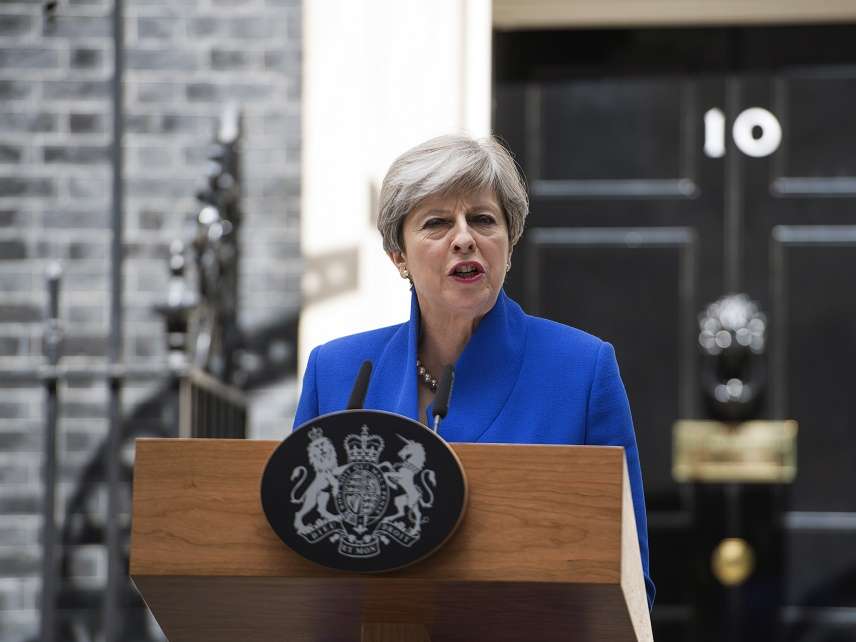How Theresa May's Snap Election Backfired
An election May called to shore up her mandate diminished her influence instead.

Theresa May's Conservative Party ended up losing 13 seats in Britain's elections yesterday. That wasn't the outcome the prime minister expected when she called a snap election in March, back when her party's lead over Jeremy Corbyn's Labour stood at 20 percent and May hoped a larger Tory majority would strengthen the United Kingdom's negotiating position on Brexit.
The Conservatives fell 7 seats short of a majority, and May announced today that she would form a coalition government with the Democratic Unionist Party (DUP), the socially conservative majority party in Northern Ireland. The Guardian reports that May will hold onto her main cabinet ministers as she assembles the new government. Prior to the election, there was speculation that May would use the opportunity to reshuffle the cabinet; last night it was unclear if May would survive the election results.
Despite the Conservatives' poor showing, the election shouldn't be seen as a referendum on Brexit. The Liberal Democrats, who served in a coalition government with the Conservatives from 2010 to 2015, campaigned vigorously on an anti-Brexit platform. The issue didn't resonate on the campaign trail, and it didn't resonate at the ballot box either: The party got a slightly smaller percentage of the vote than last time. And while they gained four seats, they expected their anti-Brexit campaign to net them dozens. Meanwhile, one LibDem who lost was the party leader, former deputy prime minister Nick Clegg.
While DUP opposes same-sex marriage and abortion, its focus in Westminster may be more on issues specific to Northern Ireland. The Unionists are "likely to be concerned that attacking the status of rights under the European Convention on Human Rights might destabilise the Good Friday Agreement between the UK and Ireland," explains David Feldman, a professor of law at Cambridge University. The DUP is also interested in maintaining access to the European single market and in keeping the post-Brexit border between Northern Ireland and Ireland—an EU member—as open as possible.
The new dispensation may also give May less room to pursue some of her other goals, such as rolling back the human rights laws that get in the way of her counterterrorist and anti-"extremist" efforts. "With a minority government, and a very heavy programme of legislation needed to make necessary arrangements for paving the way for Brexit, there is likely to be little time or inclination to embark on an unnecessary battle over human rights," Feldman says. (He adds that even if such legislation were to pass the House of Commons it could run aground in the House of Lords, "particularly as such legislation did not form part of the Conservative Party's election manifesto.")
BBC presenter David Dimbleby claimed last night that the United Kingdom has "reverted to a two-party system," as the two parties combined to receive a higher share of the popular vote than in any election since 1970. The U.K. Independence Party, which won 12.6 percent in the last election, saw its vote share collapse: It earned just 2 percent of the vote and lost its only seat in Westminster. Meanwhile, the Scottish National Party lost 21 seats. Following the failed 2014 independence referendum, the Nationalists won 54 out of 57 Scottish seats in 2015; a key component of their campaign this time was to get a new independence referendum as early as next March. A referendum any time before Brexit is complete is now highly unlikely.
Brexit negotiations will continue until March 2019. According to EU law, the U.K. will be removed from the union at that time even if negotiations have failed to produce an exit deal. Jean-Claude Juncker, the president of the European Commission, has said that yesterday's elections would have "no impact on negotiations."


Show Comments (53)